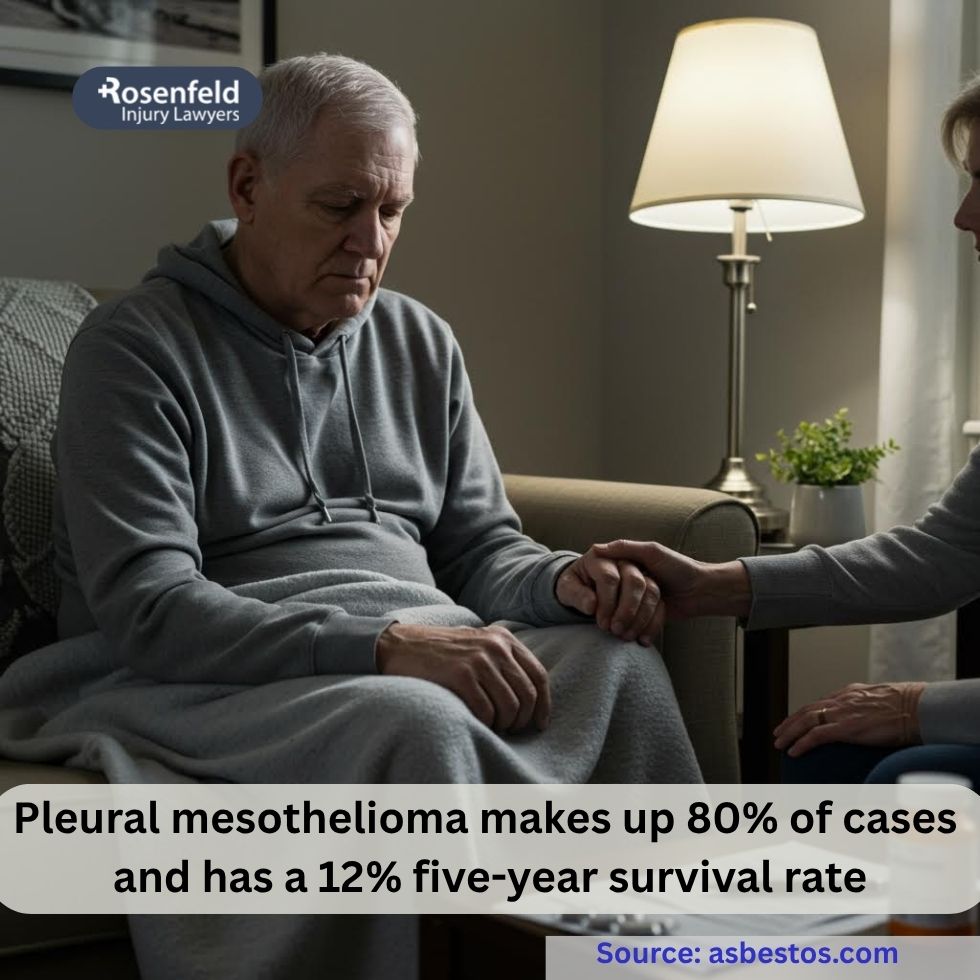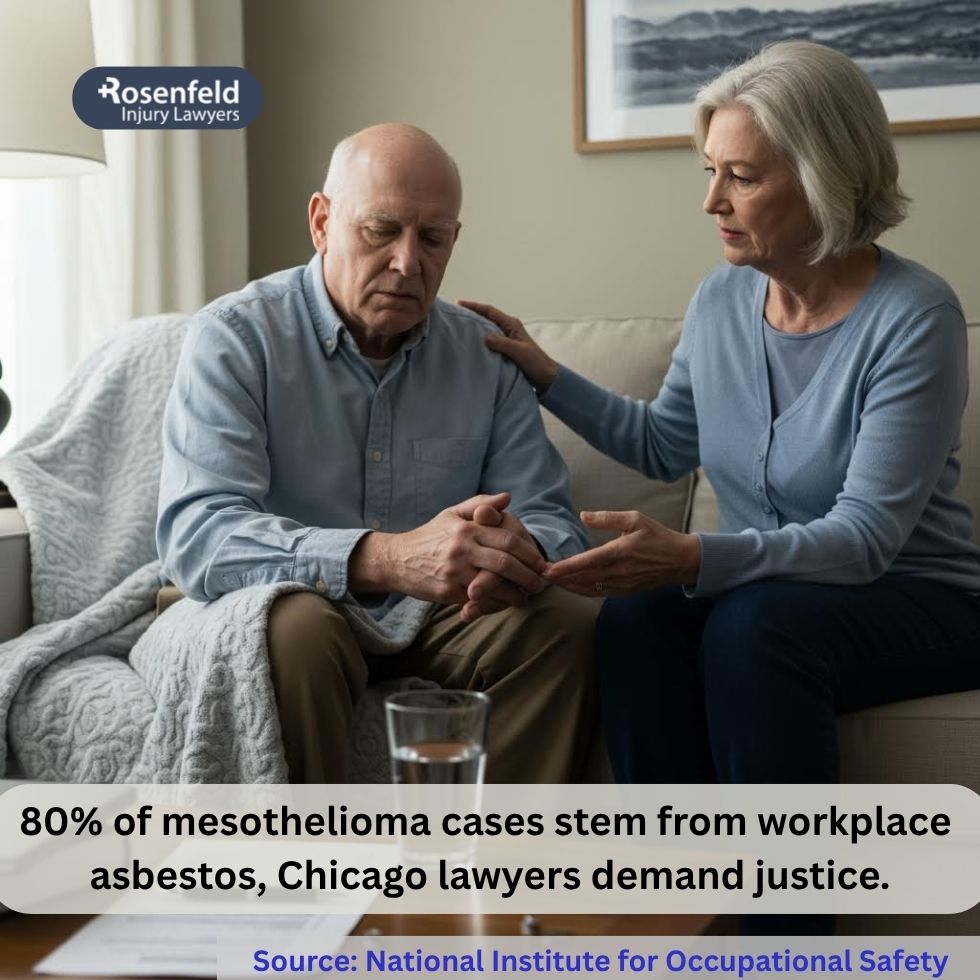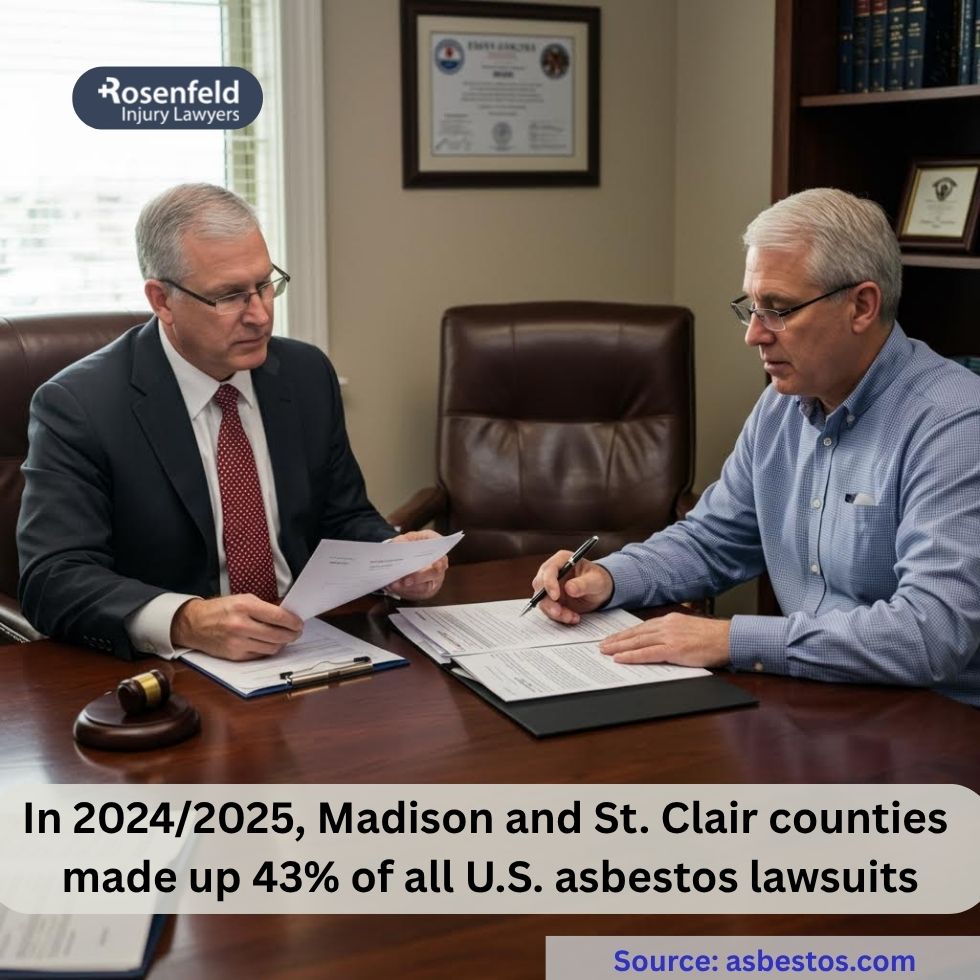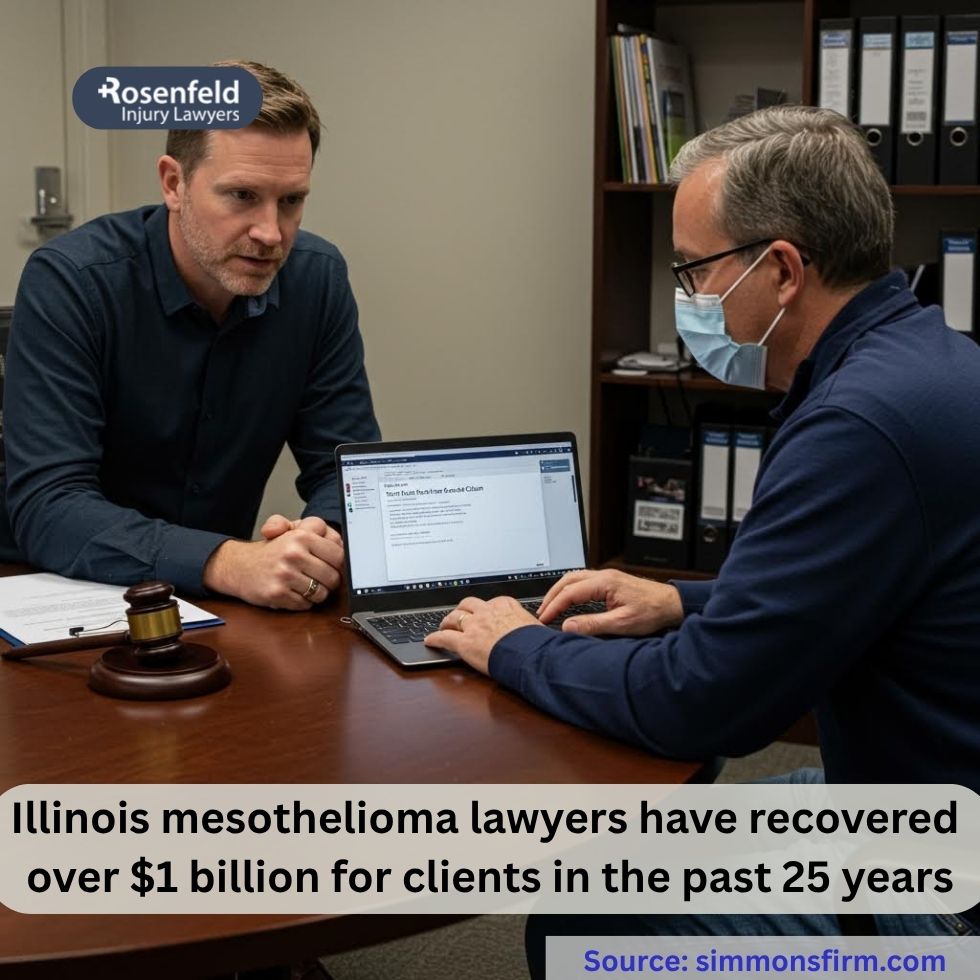- 24/7 Free Consultation: (888) 424-5757 Tap Here To Call Us
What is Mesothelioma?

What is Mesothelioma Cancer?
Malignant mesothelioma is a type of cancer that develops in the mesothelium, the thin layer of tissue surrounding the body’s internal organs. The most common form is pleural mesothelioma, which affects the lining of the lungs.
Other forms include peritoneal mesothelioma (abdomen), pericardial mesothelioma (heart), and testicular mesothelioma in the tunica vaginalis. While mesothelioma is a rare cancer, it is aggressive and often linked to asbestos exposure. A few benign cases have been documented, but the overwhelming majority of mesothelioma cases are malignant and life-threatening, requiring immediate medical attention and evaluation.
The Link Between Asbestos Exposure and Mesothelioma
Asbestos exposure is the leading cause of malignant mesothelioma. When people inhale or swallow tiny asbestos fibers, the particles can become lodged in the lung lining, abdomen, or heart. Over time, these fibers trigger chronic inflammation and scarring, eventually causing cancer cells to develop in the mesothelium.
This prolonged irritation alters normal cell behavior, leading to the formation of mesothelioma tumors. Most people diagnosed were either exposed to asbestos at work, such as in construction, shipyards, or asbestos mines, or through secondary exposure at home. The risk remains even decades after the initial exposure, making asbestos the biggest risk factor for this rare cancer.

Latency Period: Why Diagnosis Occurs Decades After Exposure
One of the most challenging aspects of mesothelioma cancer is its long latency period—the time between exposure and the onset of mesothelioma symptoms. This period can range from 10 to 60 years, meaning individuals may be diagnosed decades after their last exposure to asbestos fibers.
Because mesothelioma tumors develop slowly, most patients diagnosed are older adults who may not immediately connect past occupational exposure or secondary exposure to their current condition. This delay often leads to mesothelioma being detected in later stages, complicating treatment options and reducing life expectancy. Understanding this timeline is critical in identifying at-risk individuals.
Types of Malignant Mesothelioma and Common Symptoms
Malignant mesothelioma is classified by where the cancer cells form in the body. The most common type is malignant pleural mesothelioma, which affects the lining of the lungs (pleura).
This form makes up about 75% of mesothelioma cases. Symptoms may include chest pain, shortness of breath, persistent cough, fatigue, unexplained weight loss, and pleural effusion—a buildup of fluid between the lungs and chest wall that makes breathing difficult.
Peritoneal mesothelioma, which forms in the abdominal lining, accounts for a smaller portion of diagnoses. Peritoneal mesothelioma patients may experience abdominal pain, bloating, changes in bowel habits, weight loss, and loss of appetite. Fluid buildup in the abdomen, known as ascites, is also common.
Rarer forms include pericardial mesothelioma, which develops in the lining around the heart and can cause chest pain, heart palpitations, or arrhythmia. Testicular mesothelioma, or mesothelioma of the tunica vaginalis testis, may present as scrotal swelling or a lump, often mistaken for a hernia or other benign condition. Early detection in these rare cases remains difficult.
Mesothelioma Diagnosis Process
The mesothelioma diagnosis process begins with a review of the patient’s symptoms and medical history, especially any known asbestos exposure. A doctor will perform a physical exam and may order imaging tests such as chest X-rays, CT scans, or PET scans to detect mesothelioma tumors or fluid buildup like pleural effusion. Blood tests can check for specific biomarkers, though these are not conclusive.
If fluid is present around the lungs or abdomen, doctors may perform a fluid analysis. However, a biopsy—removing a tissue sample—is the only definitive way to confirm a mesothelioma diagnosis and determine the cell type: epithelioid, sarcomatoid, or biphasic (a mix of both). These types influence treatment options and prognosis.
Once mesothelioma is diagnosed, doctors use a staging system, such as TNM staging for pleural mesothelioma, to assess how far the cancer has spread to nearby tissue, lymph nodes, or other parts of the body. Early staging supports more effective treatment planning.

Who Is At Risk? Chicago Occupations and Sites with Asbestos Exposure History
In the Chicago area, high-risk occupations include construction workers, auto mechanics, steel mill employees, shipyard laborers, power plant workers, manufacturing employees, and insulation contractors. Specific Chicago sites with known asbestos histories include Crawford Power Station, US Steel South Works, and Pullman Railcar Factory.
Many mesothelioma patients were also exposed through secondhand exposure, where family members inhaled asbestos fibers brought home on clothing or gear. Anyone who worked in these settings—or lived with someone who did—faces a higher risk of mesothelioma cancer decades later.
Other Diseases Linked to Asbestos Exposure
In addition to mesothelioma, asbestos exposure is known to cause asbestosis, a serious lung condition marked by scarring of lung tissue that makes breathing difficult. It also greatly increases the risk of lung cancer, particularly in individuals who smoke.
While mesothelioma is a rare disease, these other asbestos-related illnesses are more common and can also lead to significant disability or death. People exposed to asbestos who develop these conditions may be eligible to file legal claims for compensation, just as they would for mesothelioma cancer. An experienced attorney can help determine the best path forward for affected individuals.
Treatment Options for Mesothelioma Patients
Mesothelioma treatments often involve a multi-modal approach—a combination of therapies based on the cancer type, stage, and the patient’s overall health. Standard treatments include surgery, which may remove part or all of the affected tissue in eligible patients, especially those with pleural mesothelioma.
Chemotherapy is commonly used to shrink mesothelioma tumors and slow progression, while radiation therapy may help relieve symptoms like chest pain and target remaining cancer cells after surgery.
Newer therapies are becoming more common. Immunotherapy helps the immune system attack mesothelioma cancer, and Tumor Treating Fields (TTFields) use electrical fields to disrupt cancer cell growth. Accessing clinical trials is especially important for patients seeking emerging treatments not yet widely available.
For many, palliative care is essential. It focuses on managing pain, easing symptoms, and improving daily function, helping mesothelioma patients maintain quality of life regardless of the stage of disease or treatment plan.

Prognosis and Life Expectancy When Mesothelioma Is Diagnosed
When mesothelioma is diagnosed, the prognosis is often poor due to late detection. The median life expectancy for most mesothelioma patients ranges from 12 to 21 months. However, survival varies based on several factors. Peritoneal mesothelioma tends to offer a better outlook than pleural mesothelioma, especially when treated aggressively.
Cell type also matters—epithelioid responds better to treatment than sarcomatoid or biphasic forms. Early-stage detection, access to experienced mesothelioma doctors, and strong overall health can improve outcomes. While still considered a rare cancer with limited curative options, newer treatments and clinical trials may offer hope for extended survival in select cases.
Legal Rights of Mesothelioma Patients and Family Members
Individuals diagnosed with mesothelioma or other asbestos-related diseases due to corporate negligence have the legal right to seek financial compensation. Many companies knew the dangers of asbestos exposure but failed to protect workers or warn the public.
As a result, mesothelioma patients and their family members may be entitled to compensation for medical expenses, lost wages, pain and suffering, and in some cases, wrongful death. Legal claims can also be filed for secondary exposure cases. Holding negligent companies accountable not only provides support for victims but also helps ensure justice for years of preventable harm caused by asbestos.
Filing Claims Against Negligent Asbestos Companies
Mesothelioma patients can pursue compensation through two main legal avenues. First, they may file asbestos lawsuits against solvent companies that exposed them to asbestos fibers through unsafe products or workplaces. Second, many bankrupt asbestos manufacturers have established asbestos trust funds, with over $30 billion currently available for eligible victims.
These asbestos trust claims allow patients to recover compensation without filing a lawsuit. Both options can cover medical expenses, lost income, and other damages related to asbestos exposure. An experienced attorney can determine the best path based on your exposure history and which companies were involved in your mesothelioma diagnosis.
VA Benefits for Veterans Exposed to Asbestos
Veterans exposed to asbestos during military service—particularly those in the Navy, shipyards, or construction roles—may be eligible for VA benefits if they develop mesothelioma or related conditions. These benefits can include monthly compensation, healthcare, and survivor benefits. Importantly, veterans can often pursue VA claims while also filing civil asbestos lawsuits or asbestos trust claims for additional compensation.
The VA recognizes asbestos exposure as a known cause of malignant mesothelioma, and filing for these benefits does not impact a veteran’s ability to seek justice from negligent asbestos companies. Legal guidance ensures both avenues are handled effectively and without conflict.

Compensation Available in Mesothelioma Cases
Mesothelioma compensation is designed to help ease the serious financial, physical, and emotional burdens caused by the disease. Victims may be entitled to recover both economic and non-economic damages.
Economic damages include direct, measurable losses such as medical expenses, lost wages, future earning potential, treatment-related travel costs, and funeral and burial expenses in fatal cases. Non-economic damages compensate for more personal losses, including pain and suffering, emotional distress, loss of companionship, and diminished quality of life. T
ogether, these forms of compensation aim to address the full impact of mesothelioma on both the patient and their loved ones.
Wrongful Death Claims for Family Members
If a loved one passes away from mesothelioma, eligible family members—such as a spouse, children, or dependents—may file a wrongful death claim. This legal action seeks compensation for their own losses, including loss of financial support, loss of companionship, funeral expenses, and the emotional toll of the death.
Wrongful death claims can be filed alongside or after a personal injury claim, depending on the timing of the loved one’s mesothelioma diagnosis and death. These claims are an important way to hold asbestos companies accountable and provide much-needed support to families devastated by asbestos-related illnesses.
Illinois Statute of Limitations: Time Limits to File
In Illinois, the statute of limitations for filing a personal injury or wrongful death lawsuit related to mesothelioma is generally two years. For personal injury, the clock typically starts from the date of diagnosis or when the illness should have reasonably been discovered (735 ILCS 5/13-202). In wrongful death cases, the two-year period begins from the date of death (740 ILCS 180/).
Because of this limited timeframe, it’s vital to contact a qualified mesothelioma law firm immediately after a diagnosis. Prompt legal action helps preserve evidence, meet filing deadlines, and protect your right to pursue full compensation from the responsible asbestos companies.
Why Hire a Specialized Chicago Mesothelioma Law Firm?
Hiring a specialized Chicago mesothelioma law firm is essential due to the complex nature of asbestos litigation. These cases require deep knowledge of asbestos products, local exposure sites, and the history of negligent asbestos companies.
An experienced firm understands how to file both lawsuits and trust fund claims and knows how to navigate Illinois-specific legal requirements. They also have access to critical resources like medical experts, investigators, and industry records needed to build a strong case. A law firm with a proven track record in Chicago mesothelioma cases can make all the difference in recovering full and fair compensation.
Our Experience Navigating Asbestos Litigation
At Rosenfeld Injury Lawyers, we bring extensive experience handling asbestos litigation for clients across Chicago and Illinois. Our team has successfully represented numerous mesothelioma patients and their families, recovering significant compensation through lawsuits and trust fund claims.
We maintain detailed databases of asbestos companies, products, and exposure sites, which help us build strong, evidence-based cases. Backed by skilled attorneys, medical consultants, and investigators, we are committed to fighting for the maximum recovery available. Our priority is helping clients secure the financial support they need to cover medical costs, lost income, and the emotional toll of a mesothelioma diagnosis.

Frequently Asked Questions About Chicago Mesothelioma Claims
How Can Asbestos Exposure That Happened Decades Ago Be Proven for a Legal Case?
Attorneys use employment records, witness testimony, product identification, and site-specific asbestos exposure databases to establish where and how you were exposed. Even if exposure occurred decades ago, experienced lawyers can connect your mesothelioma diagnosis to specific asbestos companies and products used at known exposure sites.
What Is the Difference Between Filing Asbestos Lawsuits and Filing Asbestos Trust Claims?
Asbestos lawsuits are filed against solvent companies still operating, while asbestos trust claims are submitted to trust funds set up by bankrupt asbestos manufacturers. Many mesothelioma patients pursue both. Trust claims can often be resolved faster, while lawsuits may result in larger compensation depending on the facts of the case.
What Is the Typical Mesothelioma Settlement Payout or Average Mesothelioma Verdict?
Settlement amounts vary widely based on exposure history, diagnosis, and available defendants. Mesothelioma settlements often range from $1 million to $2.4 million. Trial verdicts may be higher but are less common. Each case is unique, and an attorney can provide a more accurate estimate based on your situation.
Can Family Members Who Were Exposed Secondhand Also File Claims?
Yes. Family members who developed mesothelioma after secondhand exposure, such as inhaling asbestos fibers brought home on a worker’s clothing, may be eligible to file claims. Courts recognize the risk of secondary exposure, and compensation is often available if exposure can be traced to a known asbestos product or company.
How Long Does It Take to Get a Mesothelioma Settlement or Trust Fund Payout?
Many mesothelioma settlements resolve within 6 to 18 months. Trust fund payouts may be received in just a few months, depending on the documentation provided and the trust’s payment schedule. An experienced law firm can help expedite the process and ensure all claims are filed correctly.
How Much Does It Cost to Hire a Top Mesothelioma Law Firm?
Reputable mesothelioma law firms, including ours, work on a contingency fee basis. This means you pay nothing upfront. Legal fees are only collected if we recover compensation on your behalf. This ensures clients can pursue justice without financial risk, regardless of their current income or health status.
Get a Free Consultation with Our Mesothelioma Legal Team

If you or a loved one has been diagnosed with mesothelioma, the legal team at Rosenfeld Injury Lawyers is here to help. We offer a free consultation to discuss your case, explain your legal options, and help you pursue the compensation you deserve. With deep experience in asbestos litigation and a strong track record in Chicago mesothelioma cases, we’re ready to fight on your behalf. There are no upfront fees—we only get paid if we recover for you.
Call our Chicago personal injury lawyers at (888) 424–5757 or fill out our contact form to schedule your free consultation.
All content undergoes thorough legal review by experienced attorneys, including Jonathan Rosenfeld. With 25 years of experience in personal injury law and over 100 years of combined legal expertise within our team, we ensure that every article is legally accurate, compliant, and reflects current legal standards.







